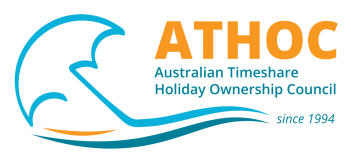- Peak industry body The Australian Timeshare and Holiday Ownership Council says changes to regulatory framework have unintended consequences for existing timeshare owners and wider tourism sector
- There were approximately 198,000 timeshare owners in Australia in 2019, approximately 1.1% more than in 2016. Of this, approximately 99,400 owners (55.2%) have purchased more timeshare since their original purchase.
- The activity of the timeshare industry directly supported over 4,350 FTE jobs in the Australian economy, paying over $300 million in wages and salaries, as well as producing $468.9 million in Gross Domestic Product (GDP)
Gold Coast, Australia – 11 December 2020 – The Australian Timeshare and Holiday Ownership Council (ATHOC) welcomes and actively supports consumer protection but is concerned ASIC’s new requirements for timeshare clubs will have significant negative impact on Australian tourism and existing owners.
Quotes attributable to ATHOC President Craig Wood:
“With COVID-19 having smashed the tourism sector of which timeshare is a major industry, now is not the time for more regulatory barriers, a position the Government has stated itself.
“While the Australian tourism industry is hurting like never before, the timeshare industry continues to provide jobs, visitor spending and $468 million in GDP per annum. Timeshare is a significant tourism sector and fuels regional economies all year round.
While we welcome and support consumer protection and continue to proactively implement consumer protection measures, these changes will have cost implications for and unintended detriment on existing owners.”
“We have already raised the practical implications and negative impact with ASIC along with a number of additional measures which support both consumer protection and the ongoing growth of this important sector.”
“More than 70 percent of timeshare sales are to existing timeshare owners, many of whom are repeat purchasers, who love and utilise their respective clubs and provide important economic stimulus for the local community.
“We have worked hard for many years now to make it easy for consumers to make a considered and informed choice about whether timeshare is the best holiday lifestyle choice for them. We are concerned that the regulatory changes do have unintended negative consequences for existing owners and we will be taking these concerns up with ASIC.”
“This includes our concern that the industry has been inappropriately pigeon holed as a financial investment which it is not . Timeshare has and will always will be a holiday or lifestyle product.”
“We look forward to continuing to work with our elected representatives to ensure that the timeshare industry can make the fastest recovery possible from the pandemic, by having a regulatory framework that supports its recovery and does not hinder it, with a framework suited to a holiday product.”
FACTS
- Timeshare while a lifestyle product is one of the most highly regulated holiday products with timeshare clubs in Australia classed as managed investment schemes under the Corporations Act and regulated by ASIC.
- Some of the world’s most respected hotel chains offer timeshare in Australia.
- There are 101 timeshare resorts in Australia
- 1,085,900 holiday nights are occupied per annum by timeshare owners in Australia each year.
- This equates to an occupancy rate for timeshare of 87.3% nationally compared to average national hotel occupancy of 75%
- There are 184,500 timeshare owners Australia owners who each spend on average over of $3,538 per travel party per trip.
- Australian timeshare owners and their guests spend $443.1 million offsite at tours, attractions and dining while on holiday in Australia per annum, yielding total direct revenue, or output, of approximately $958.5 million.
- With that many owners not holidaying aboard this year, we can expect that figure to more than triple.
- $14.5 million in timeshare exchange company revenue, $231.5 million in timeshare resort revenue is generated annually
$23.6 million in spent in capital improvement expenditure with resort refurbishments and developments was spent by the timeshare industry in Australia annually - This activity of the timeshare industry directly supported over 4,350 FTE jobs in the Australian economy, paying over $300 million in wages and salaries
- $468.9 million in Gross Domestic Product (GDP) is generated per annum by the timeshare industry.
- Timeshare owners own points which have an expiry date so it encourages them to holiday.
- Timeshare owners spend more on holiday, because their holidays are essentially prepaid.
- Timeshare has evolved as an industry. Most timeshare owners in Australia have access to a large network of resorts.
- Timeshare is a significant tourism sector which fuels regional economies all year round.
- Timeshare properties are typically suited to social distancing with large apartments in expansive resorts.
- The timeshare companies have responded rapidly to COVID-19 by introducing globally recognised hygiene practices and protocols
Source: Holiday Ownership Economic Impact Study AEC – 2020
MEDIA CONTACT: LJ Loch, Alpha Consulting ljloch@alphaconsulting.global 0488038555


















